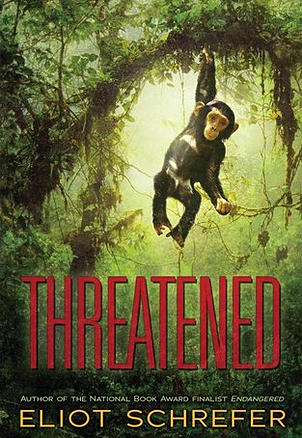Luc, orphaned when his mother dies from HIV, is in debt to Monsieur Tatagani, a moneylender and crook in Franceville, Gabon, who paid his mother’s medical bills. For the tips and wages to repay Tatagani, Luc works at a hotel bar in the city, but he is always certain to be “home” before dark, recalling the days when his mother would tell tales of the “mock men,” chimpanzees whose screams foreshadowed violence in depths of the jungle, the “Inside.”
These are the conditions and the setting as Eliot Schrefer’s book Threatened opens, and so it goes until Professor Abdul Mohammed arrives. The Prof, who wishes to be Africa’s Jane Goodall, is an Arab from the University of Leipzig studying the chimpanzees. He takes an interest in Luc, who has decided the mysterious man with his pet vervet monkey named Omar is his ticket to freedom. The professor pays off Luc’s debt to Monsieur Tatagani, and Luc signs on as a research assistant.
On their safari into the Inside, Luc learns that both he and the professor are victims of heartbreak, having been let down by humans. To cope, Prof puts his energies into studying the chimpanzee, whom he believes have feelings as complicated and strong as those of a human, making them “worthy of our respect and protection” (51). Luc, however, doesn’t immediately agree. Attacked by the chimpanzees, Luc considers them vicious brutes and desires revenge, but with the professor’s urging, he grows to understand the mock men, giving them names like Mango, Drummer, and Beggar, and begins to see them as creatures with similar wants and needs. When the professor grows ill, Luc takes up his research and is determined to live among the chimps, lounging and foraging with them. Eventually, he understands their version of feeling and comes to know the chimps like family. They, too, know loneliness, rejection, grief, and anger: “Attack and forgive seemed to be the way of chimpanzee life” (184).
Living on the Inside hardens Luc so that he comes to believe that those wandering without permission into the forest to trap the animals that live alongside him feels like burglary. He grows savagely protective of his companions who “clearly don’t expect justice like humans do, but at the same time . . . show a lot more tolerance” (244). From the chimps, Luc further learns not only the value of living in the present but that “all survival stories that end happily are also family stories” (84) and that “no matter how his life changes, he will always have sunshine” (23).
- Posted by Donna

